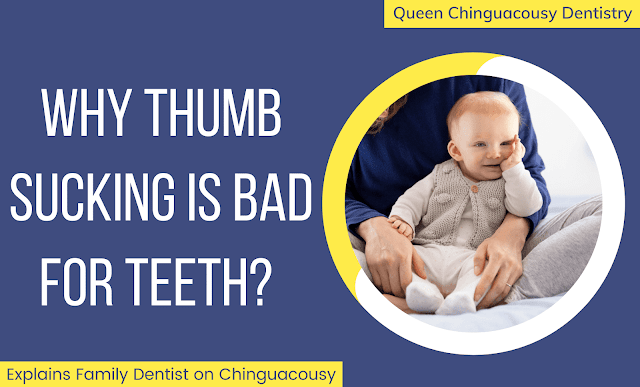Thumb sucking is a common habit among children because it relaxes and soothes them. A Family Dentist says that thumb sucking and pacifier use can harm a child's teeth and overall oral health.
If a child frequently reverts to thumb sucking, it can harm their teeth in the long run. Continue reading to learn how thumb sucking and pacifier use can harm your child's teeth and overall oral health.
Why Do Children Suck Their Thumb?
The dentist explains that babies are born with a suckling reflex to feed themselves. Because sucking produces a positive association and endorphins, babies frequently transfer the action to other objects such as thumbs, fingers, pacifiers, Sippy cups, and similar items in order to experience the same pleasurable sensation. It is also a calming habit that aids in the child's relaxation, similar to having a "safety" item such as a blanket.
Also Read: Tips to Teach Children about Dental Hygiene from an Early Age
How Thumb Sucking Affects Teeth
Many children discover subconsciously that the habit relieves boredom or soothes them when they are tired, sick, or in a stressful situation.
It is critical to stop thumb sucking before your
child's permanent teeth erupt, even if some of the effects of vigorous sucking
have already occurred.
Thumb sucking can have the following consequences:
- Palatal narrowing occurs when the roof of the mouth does not fully
expand due to the forces of thumb or pacifier sucking.
- Tooth misalignment and tooth eruption
- Malocclusion and bite problems, such as an open bite,
- Changes in the tongue's swallowing action and breathing patterns
- Calloused fingers or thumbs
- Speech development is lacking
The longer the habit persists, the more damage it can cause. Encouraging your child to stop sucking on his or her finger or thumb may be all that is required to assist your child in quitting the habit during the day. (Positive reinforcement and unconditional love go a long way!) Night-time habits, on the other hand, can be more difficult to break, but there are still ways you can help your child stop thumb sucking.
Pacifier vs. Thumb Sucking
Eliminating the habit as your child grows older is dependent on the child's desire to stop. Pacifier use may be easier to eliminate because it can be removed. Typically, I recommend removing the pacifier at 18 months or earlier by marking a date on the calendar and discontinuing use during the day and at night.
When your child begins to talk while holding the pacifier between his or her teeth or lips, the tongue actions associated with speech and swallowing may develop incorrectly. This is why it's critical to keep track of your child's pacifier usage and set a date for weaning them off the pacifier.
How to Stop Thumb Sucking
Family Dentist on Chinguacousy, RD can provide you with specific suggestions for helping your child stop thumb sucking. Do these things:
- Reward and praise your child for not sucking
their thumb.
- Determine the source of the thumb sucking
(often anxiety or boredom) and work to eliminate it.
- As they sleep, some children suck their
thumbs. Wear mittens to bed and play soothing music to help your child
sleep.
- Be patient and try not to become discouraged; thumb sucking is a difficult habit for children to break.
Overall, thumb sucking is a natural habit for babies and toddlers, but it can be detrimental to their oral health if practiced for an extended period of time.
Speak with your Family
Dentist on Chinguacousy about thumb-sucking habits and how to break the
habit before it harms your child's oral growth and development. Book an
appointment to get started - contact us at (905) 453-0999.

Comments
Post a Comment